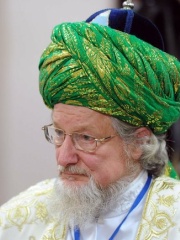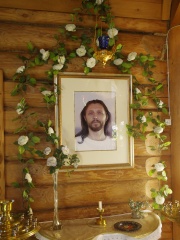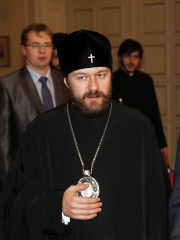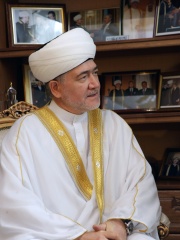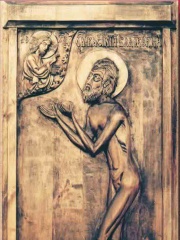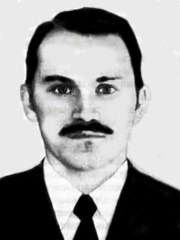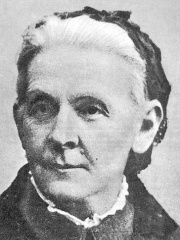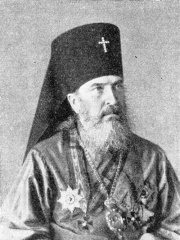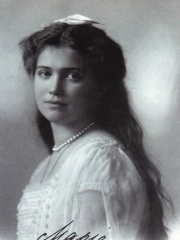
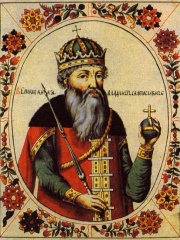
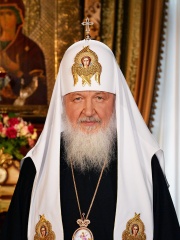
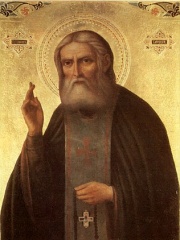
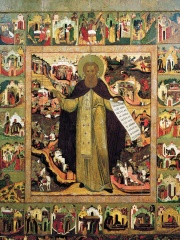
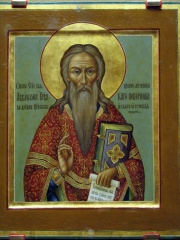
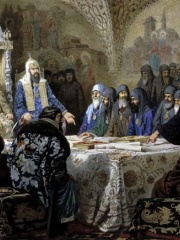
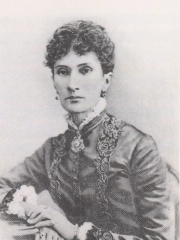
The Most Famous
RELIGIOUS FIGURES from Russia
This page contains a list of the greatest Russian Religious Figures. The pantheon dataset contains 3,187 Religious Figures, 46 of which were born in Russia. This makes Russia the birth place of the 14th most number of Religious Figures behind Israel, and Greece.
Top 10
The following people are considered by Pantheon to be the top 10 most legendary Russian Religious Figures of all time. This list of famous Russian Religious Figures is sorted by HPI (Historical Popularity Index), a metric that aggregates information on a biography's online popularity. Visit the rankings page to view the entire list of Russian Religious Figures.

1. Grand Duchess Maria Nikolaevna of Russia (1899 - 1918)
With an HPI of 77.97, Grand Duchess Maria Nikolaevna of Russia is the most famous Russian Religious Figure. Her biography has been translated into 49 different languages on wikipedia.
Grand Duchess Maria Nikolaevna of Russia (Russian: Мария Николаевна; 26 June [O.S. 14 June] 1899 – 17 July 1918) was the third daughter of Tsar Nicholas II and Tsarina Alexandra Feodorovna. Her murder following the Russian Revolution of 1917 resulted in her canonization as a passion bearer by the Russian Orthodox Church. During her lifetime, Maria, too young to become a Red Cross nurse like her elder sisters during World War I, was patroness of a hospital and instead visited wounded soldiers. Throughout her lifetime she was noted for her interest in the lives of the soldiers. The flirtatious Maria had a number of innocent crushes on the young men she met, beginning in early childhood. She hoped to marry and have a large family. She was an elder sister of Grand Duchess Anastasia Nikolaevna of Russia, whose alleged escape from the assassination of the imperial family was rumored for nearly 90 years. However, it was later proven that Anastasia did not escape and that those who claimed to be her were imposters. In the 1990s, it was suggested that Maria might have been the grand duchess whose remains were missing from the Romanov grave that was discovered near Yekaterinburg, Russia and exhumed in 1991. Further remains were discovered in 2007, and DNA analysis subsequently proved that the entire Imperial family had been murdered in 1918. A funeral for the remains of Maria and Alexei to be buried with their family in October 2015 was postponed indefinitely by the Russian Orthodox Church, which took custody of the remains in December and declared without explanation that the case required further study; the 44 partial bone fragments remain stored in a Russian state repository.

2. Vladimir the Great (958 - 1015)
With an HPI of 77.89, Vladimir the Great is the 2nd most famous Russian Religious Figure. His biography has been translated into 74 different languages.
Vladimir I Sviatoslavich or Volodymyr I Sviatoslavych (Old East Slavic: Володимѣръ Свѧтославичь, romanized: Volodiměr Svętoslavič; Christian name: Basil; c. 958 – 15 July 1015), given the epithet "the Great", was Prince of Novgorod from 970 and Grand Prince of Kiev from 978 until his death in 1015. The Catholic Church and the Eastern Orthodox Church both canonised him as Saint Vladimir. Vladimir's father was Sviatoslav I of the Rurik dynasty. After the death of his father in 972, Vladimir, who was then the prince of Novgorod, was forced to flee abroad after his brother Yaropolk murdered his other brother Oleg in 977 to become the sole ruler of Rus'. Vladimir assembled a Varangian army and returned to depose Yaropolk in 978. By 980, Vladimir had consolidated his realm to the Baltic Sea and solidified the frontiers against incursions of Bulgarians, Baltic tribes and Eastern nomads. Originally a follower of Slavic paganism, Vladimir converted to Christianity in 988, and Christianized the Kievan Rus.

3. Patriarch Kirill of Moscow (b. 1946)
With an HPI of 72.65, Patriarch Kirill of Moscow is the 3rd most famous Russian Religious Figure. His biography has been translated into 62 different languages.
Kirill or Cyril (Russian: Кирилл, Church Slavonic: Стѣ́йшїй патрїа́рхъ Кѷрі́ллъ, secular name Vladimir Mikhailovich Gundyayev, Russian: Влади́мир Миха́йлович Гундя́ев; born 20 November 1946) is a Russian Orthodox bishop. He became Patriarch of Moscow and all Rus' and Primate of the Russian Orthodox Church on 1 February 2009. Prior to becoming Patriarch, Kirill was Archbishop (later Metropolitan) of Smolensk and Kaliningrad, and also Chairman of the Russian Orthodox Church's Department for External Church Relations. He has been a permanent member of the Holy Synod since 1989. A close ally of Russian leader Vladimir Putin, Kirill has described Putin's rule as "a miracle of God". According to Putin, Kirill's father baptized him. During his tenure as Patriarch of Moscow and all Rus', Kirill has brought the Russian Orthodox Church closer to the Russian state. Kirill's relationship with Bartholomew I of Constantinople, Ecumenical Patriarch and the spiritual leader of Eastern Orthodox Christians worldwide, has been tense. Kirill has lauded the Russian invasion of Ukraine, justifying the war as a struggle against "forces of evil". The World Russian People's Council under his leadership described the conflict as a "Holy War". Clergy in other Orthodox Churches have condemned his remarks, with Bartholomew I saying that Kirill's support for Putin and the war were "damaging to the prestige of the whole of Orthodoxy".

4. Seraphim of Sarov (1754 - 1833)
With an HPI of 71.65, Seraphim of Sarov is the 4th most famous Russian Religious Figure. His biography has been translated into 37 different languages.
Seraphim of Sarov (Russian: Серафим Саровский; 30 July [O.S. 19 July] 1754 or 1759 – 14 January [O.S. 2 January] 1833), born Prókhor Isídorovich Moshnín (Mashnín) [Про́хор Иси́дорович Мошни́н (Машни́н)], is one of the most renowned Russian saints and is venerated in the Eastern Orthodox Church and the Anglican Communion. He is generally considered the greatest of the 18th-century startsy (elders). Seraphim extended the monastic teachings of contemplation, theoria and self-denial to the layperson. He taught that the purpose of the Christian life was to receive the Holy Spirit. Perhaps his most popular quotation amongst his devotees is "Acquire the Spirit of Peace, and thousands around you will be saved." Seraphim was glorified by the Russian Orthodox Church in 1903.
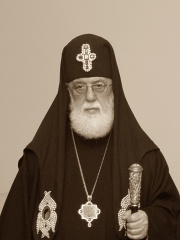
5. Ilia II of Georgia (b. 1933)
With an HPI of 69.97, Ilia II of Georgia is the 5th most famous Russian Religious Figure. His biography has been translated into 51 different languages.
Ilia II (Georgian: ილია II, romanized: ilia II; born 4 December 1933), also transcribed as Ilya or Elijah, is the 82nd and current Catholicos-Patriarch of All Georgia, the spiritual leader of the Georgian Orthodox Church. He is officially styled as "Catholicos-Patriarch of All Georgia, the Archbishop of Mtskheta-Tbilisi and Metropolitan Bishop of Bichvinta and Tskhum-Abkhazia, His Holiness and Beatitude Ilia II."

6. Sergius of Radonezh (1314 - 1392)
With an HPI of 68.26, Sergius of Radonezh is the 6th most famous Russian Religious Figure. His biography has been translated into 39 different languages.
St. Sergius of Radonezh (Russian: Сергий Радонежский, romanized: Sergiy Radonezhsky; 14 May 1314 – 25 September 1392) was a Russian spiritual leader and monastic reformer. He was the founder of the Trinity Lavra of St. Sergius near Moscow, what is now the most venerated monastic house in Russia. He exerted the greatest influence of any personage on the Russian Orthodox Church. Together with St. Seraphim of Sarov, he is one of the most highly venerated saints in Russia. Historian Serge Aleksandrovich Zenkovsky wrote that St. Sergius, along with Epiphanius the Wise, Stephen of Perm, and the painter Andrei Rublev, signified "the Russian spiritual and cultural revival of the late fourteenth and early fifteenth century".

7. Avvakum (1620 - 1682)
With an HPI of 68.05, Avvakum is the 7th most famous Russian Religious Figure. His biography has been translated into 41 different languages.
Avvakum Petrov (Russian: Аввакум Петров; 20 November 1620/1621 – 14 April 1682; also spelled Awakum) was a Russian Old Believer and protopope of the Kazan Cathedral on Red Square who led the opposition to Patriarch Nikon's reforms of the Russian Orthodox Church. His autobiography and letters to the tsar and other Old Believers such as Feodosia Morozova are considered masterpieces of 17th-century Russian literature.

8. Patriarch Nikon of Moscow (1605 - 1681)
With an HPI of 67.67, Patriarch Nikon of Moscow is the 8th most famous Russian Religious Figure. His biography has been translated into 52 different languages.
Nikon (Russian: Ни́кон, Old spelling: Нїконъ), born Nikita Minin (Никита Минин; 7 May [O.S. 27 April] 1605 – 17 August [O.S. 7 August] 1681) was the seventh Patriarch of Moscow and all Rus' of the Russian Orthodox Church, serving officially from 1652 to 1666. He was renowned for his eloquence, energy, piety and close ties to Tsar Alexis of Russia. Nikon introduced many reforms, including liturgical reforms that were unpopular among conservatives. These divisions eventually led to a lasting schism known as Raskol (schism) in the Russian Orthodox Church. For many years, he was a dominant political figure, often equaling or even overshadowing the Tsar. In December 1667, Nikon was tried by a synod of church officials, deprived of all his sacerdotal functions, and reduced to the status of a simple monk.

9. Nadezhda von Meck (1831 - 1894)
With an HPI of 67.48, Nadezhda von Meck is the 9th most famous Russian Religious Figure. Her biography has been translated into 25 different languages.
Nadezhda Filaretovna von Meck (Russian: Надежда Филаретовна фон Мекк; 10 February [O.S. 29 January] 1831 – 13 January 1894) was a Russian businesswoman who became an influential patron of the arts, especially music. She is best known today for her artistic relationship with Pyotr Ilyich Tchaikovsky, supporting him financially for thirteen years, so that he could devote himself full-time to composition, while stipulating that they were never to meet. Tchaikovsky dedicated his Symphony No. 4 in F minor to her. She also gave financial support to several other musicians, including Nikolai Rubinstein and Claude Debussy.
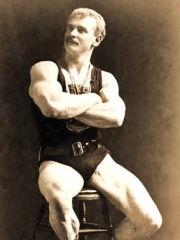
10. Eugen Sandow (1867 - 1925)
With an HPI of 67.43, Eugen Sandow is the 10th most famous Russian Religious Figure. His biography has been translated into 32 different languages.
Eugen Sandow (born Friedrich Wilhelm Müller, German: [ˈfʁiːdʁɪç ˈvɪlhɛlm ˈmʏlɐ]; 2 April 1867 – 14 October 1925) was a German bodybuilder and showman from Prussia. He was born in Königsberg, and became interested in bodybuilding at the age of ten during a visit to Italy. After a time in the circus, Sandow studied under strongman Ludwig Durlacher in the late 1880s. On Durlacher's recommendation, he began entering strongman competitions, performing in matches against leading figures in the sport such as Charles Sampson, Frank Bienkowski, and Henry McCann. In 1901 he organised what is believed to be the world's first major bodybuilding competition. Set in London's Royal Albert Hall, Sandow judged the event alongside author Sir Arthur Conan Doyle and athlete/sculptor Charles Lawes-Wittewronge. Sandow is known as the "father of modern bodybuilding".
People
Pantheon has 46 people classified as Russian religious figures born between 958 and 1966. Of these 46, 7 (15.22%) of them are still alive today. The most famous living Russian religious figures include Patriarch Kirill of Moscow, Ilia II of Georgia, and Talgat Tadzhuddin. The most famous deceased Russian religious figures include Grand Duchess Maria Nikolaevna of Russia, Vladimir the Great, and Seraphim of Sarov.
Living Russian Religious Figures
Go to all RankingsPatriarch Kirill of Moscow
1946 - Present
HPI: 72.65
Ilia II of Georgia
1933 - Present
HPI: 69.97
Talgat Tadzhuddin
1948 - Present
HPI: 58.27
Grigory Rodchenkov
1958 - Present
HPI: 54.11
Vissarion
1961 - Present
HPI: 53.16
Hilarion
1966 - Present
HPI: 51.13
Rawil Gaynetdin
1959 - Present
HPI: 48.27
Deceased Russian Religious Figures
Go to all RankingsGrand Duchess Maria Nikolaevna of Russia
1899 - 1918
HPI: 77.97
Vladimir the Great
958 - 1015
HPI: 77.89
Seraphim of Sarov
1754 - 1833
HPI: 71.65
Sergius of Radonezh
1314 - 1392
HPI: 68.26
Avvakum
1620 - 1682
HPI: 68.05
Patriarch Nikon of Moscow
1605 - 1681
HPI: 67.67
Nadezhda von Meck
1831 - 1894
HPI: 67.48
Eugen Sandow
1867 - 1925
HPI: 67.43
Basil Fool for Christ
1468 - 1552
HPI: 66.96
Aleksandr Akimov
1953 - 1986
HPI: 66.80
Maria Alexandrovna Ulyanova
1835 - 1916
HPI: 66.11
Nicholas of Japan
1836 - 1912
HPI: 65.04
Overlapping Lives
Which Religious Figures were alive at the same time? This visualization shows the lifespans of the 23 most globally memorable Religious Figures since 1700.

